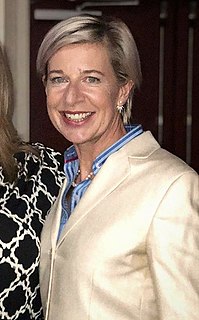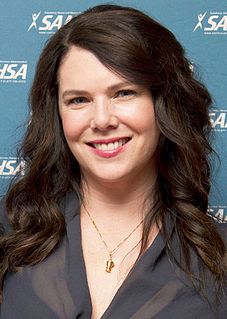A Quote by Katie Hopkins
When I hear a girl has had two babies by the age of 16, I think two things: Is she called Chardonnay, and what is she doing with her life?
Related Quotes
From an early age she had developed the art of being alone and generally preferred her own company to anyone else’s. She read books at enormous speed and judged them entirely on her ability to remove her from her material surroundings. In almost all the unhappiest days of her life she had been able to escape from her own inner world by living temporarily in someone else’s, and on the two or three occasions that she had been too upset to concentrate she had been desolate.
Over and over in the play my character says, "I'm thirty-two years old," as if that should explain everything that's wrong in her life. I don't know what it's like to be thirty-two, but I can imagine. I imagine she means she's stuck in an in-between time, she's at an age that isn't a milestone but more of a no-man's-land, an age where she's feeling like her hopes are fading.
In this moment she felt that she had been robbed of an enormous number of valuable things, whether material or intangible: things lost or broken by her own fault, things she had forgotten and left in houses when she moved: books borrowed from her and not returned, journeys she had planned and had not made, words she had waited to hear spoken to her and had not heard, and the words she meant to answer with. . . .
She writes that one of the moments that she felt most useful was when her mother had a headache, and she would stroke her head and rub her forehead. And I think Eleanor Roosevelt's entire life was dedicated to two things: (one) making it better for all people, people in trouble and in need, like her family.
[My mother] was the oldest of two sisters and two brothers, and she grew up with her brothers, who were about her age. She grew up, to the age of ten, like a wild colt, and then all of a sudden that was over. They had forced on her her 'woman's destiny' by saying, 'This isn't done, this isn't good, this isn't worthy of a lady.'
Mother Teresa was a hero of mine for a long time. I just like the way she took on the world from a very humble place. She has a great quote. When she was leaving her monestary to start Sisters of Charity, she had two pennies. She was asked by a head priest what she could possibly do with two pennies. She said, 'Nothing. But with two pennies and God, I can do anything'.
She was, in fact, quite a pleasant looking girl, even if her bosom had clearly been intended for a girl two feet taller; but she was not Her. The Egregious Professor of Grammar and Usage would have corrected this to "she was not she," which would have caused the Professor of Logic to spit out his drink.
She was made up of more, too. She was the books she read in the library. She was the flower in the brown bowl. Part of her life was made from the tree growing rankly in the yard. She was the bitter quarrels she had with her brother whom she loved dearly. She was Katie's secret, despairing weeping. She was the shame of her father stumbling home drunk. She was all of these things and of something more...It was what God or whatever is His equivalent puts into each soul that is given life - the one different thing such as that which makes no two fingerprints on the face of the earth alike.
All that Ruby said was so horribly true, she was leaving everything she cared for. She had laid up her treasures on earth only. She had lived solely for the little things of life, the things that pass, forgetting the great things that go onward into eternity bridging the gulf between the two lives and making of death a mere passing of one dwelling to the other. From twilight to unclouded day. ...it was no wonder her soul clung in blind helplessness to the only things she knew and loved.
Like, she had a caterer, she had wardrobe people, she had two makeup artists... I mean, we have makeup and we have wardrobe, but Felicia [Day] was, like, on it. She had two cameras operating, sets, extras everywhere. It was unbelievable. I don't know what her budget was or is, but she had sponsors for her show, and we don't have a sponsor yet, so basically, the difference is, our moms make our costumes.
Occasionally, on screen, Barbara [Stanwyck] had a wary, watchful quality about her that I've noticed in other people who had bad childhoods; they tend to keep an eye on life because they don't think it can be trusted. After her mother was killed by a streetcar, she had been raised in Brooklyn by her sisters, and from things she said, I believe she had been abused as a child. She had lived an entirely different life than mine, that's for sure, which is one reason I found her so fascinating. I think her early life was one reason she had such authenticity as an actress, and as a person.
She remembered that once, when she was a little girl, she had seen a pretty young woman with golden hair down to her knees in a long flowered dress, and had said to her, without thinking, "Are you a princess?" The girl had laughed very kindly at her and asked her what her name was. Blanche remembered going away from her, led by her mother's hand, thinking to herself that the girl really was a princess, but in disguise. And she had resolved that someday, she would dress as though she were a princess in disguise.
At that moment a very good thing was happening to her. Four good things had happened to her, in fact, since she came to Misselthwaite Manor. She had felt as if she had understood a robin and that he had understood her; she had run in the wind until her blood had grown warm; she had been healthily hungry for the first time in her life; and she had found out what it was to be sorry for someone.
Sophie has a gift," she said. "She has the Sight. She can see what others do not. In her old life she often wondered if she was mad. Now she knows that she is not mad but special. There, she was only a parlor maid, who would likely have lost her position once her looks had faded. Now she is a valued member of our household, a gifted girl with much to contribute.



































